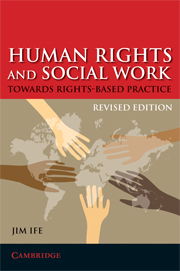Book contents
- Frontmatter
- Contents
- About the author
- Acknowledgments
- Introduction
- 1 Human Rights in a Globalised World
- 2 Human Rights: Beyond Traditional Formulations
- 3 Public and Private Human Rights
- 4 Culture and Human Rights
- 5 Human Rights and Human Needs
- 6 Human Rights and Obligations
- 7 Ethics and Human Rights
- 8 Participation in the Human Rights Discourse
- 9 Constructing Human Rights for Social Work Practice
- 10 Achieving Human Rights through Social Work Practice
- 11 Respecting Human Rights in Social Work Practice
- 12 Conclusion: Prospects for Human Rights Practice
- Appendix I The Universal Declaration of Human Rights
- Appendix II Other Human Rights Declarations, Treaties and Conventions
- References
- Index
10 - Achieving Human Rights through Social Work Practice
- Frontmatter
- Contents
- About the author
- Acknowledgments
- Introduction
- 1 Human Rights in a Globalised World
- 2 Human Rights: Beyond Traditional Formulations
- 3 Public and Private Human Rights
- 4 Culture and Human Rights
- 5 Human Rights and Human Needs
- 6 Human Rights and Obligations
- 7 Ethics and Human Rights
- 8 Participation in the Human Rights Discourse
- 9 Constructing Human Rights for Social Work Practice
- 10 Achieving Human Rights through Social Work Practice
- 11 Respecting Human Rights in Social Work Practice
- 12 Conclusion: Prospects for Human Rights Practice
- Appendix I The Universal Declaration of Human Rights
- Appendix II Other Human Rights Declarations, Treaties and Conventions
- References
- Index
Summary
THe previous chapters, in exploring various aspects of human rights and the implications of seeing social work as a human rights profession, have touched on many important practice issues in relation to social work. The issues are not new. Ethics, social control, the place of policy and advocacy, professionalism, the role of expertise, linking the personal and the political, cultural relativism, need definition, empowerment, and so on are all familiar and are frequently contested within social work. In the preceding chapters, however, they have arisen not out of a consideration of social work per se but rather out of a discussion of human rights and the possible implications of a human rights approach to practice. Various social work practice principles emerged from these discussions, and the purpose of this chapter is to bring these together in order to derive an overall picture of human rights-based social work. This will be done around three organising themes: theoretical foundations, empowerment and contextual/universal issues.
Theoretical foundations
Before moving to more directly practice-oriented aspects of social work, it is important to examine some other more ‘theoretical’ issues which are implied by the discussions of earlier chapters. These represent important foundations for human rights practice.
Praxis
The idea of ‘praxis’ (Freire 1996) is that theory and practice, or learning and doing, cannot be separated. It is through theory/reflection that we develop practice/action, and at the same time it is through practice/action that we develop theory/reflection. We learn by doing and we do by learning.
- Type
- Chapter
- Information
- Human Rights and Social WorkTowards Rights-Based Practice, pp. 159 - 187Publisher: Cambridge University PressPrint publication year: 2008



